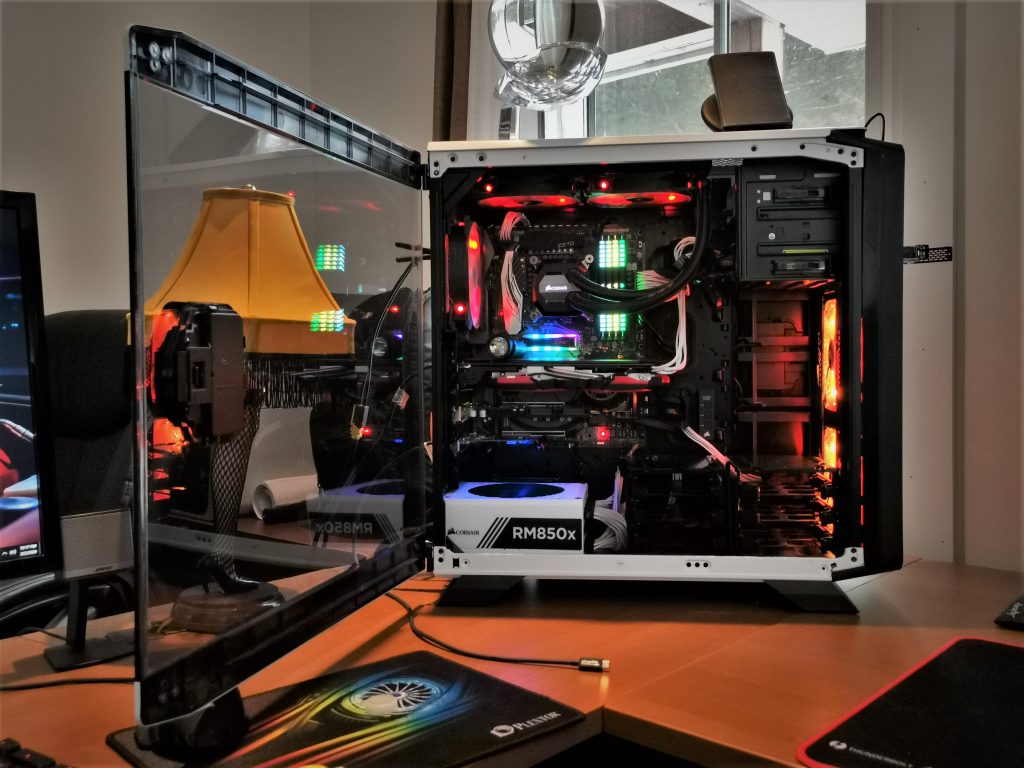TSSDR TEST BENCH AND PROTOCOL
CFexpress Card testing at TSSDR differs slightly, depending on whether we are looking at consumer or enterprise storage media. For our Delkin Devices CFexpress Type B card testing today, our goal is to test in a system that has been optimized with our SSD Optimization Guide. To see the best performance possible, the CPU C states have been disabled, C1E support has been disabled, and Enhanced Intel SpeedStep Technology (EIST) has been disabled.
SYSTEM COMPONENTS
The components of this Test Bench are detailed below. All hardware is linked for purchase and product sales may be reached by a simple click on the individual item. As well, the title is linked back to the individual build article where performance testing can be validated.
TSSDR ASROCK Z370 TAICHI TEST BENCH (link)
| PC CHASSIS: | Corsair Graphite 760T Arctic White Window Chassis |
| MOTHERBOARD: | ASRock Z370 Taichi |
| CPU: | Intel Coffee Lake Core i7-8770K |
| CPU COOLER: | Corsair Hydro Series H110i GTX |
| POWER SUPPLY: | Corsair RM850x 80Plus |
| GRAPHICS: | MSI Radeon RX570 |
| MEMORY: | Corsair Vengeance RGB 32GB DDR4 3600Mhz C18 |
| STORAGE: | Intel Optane 900P 480GB SSD |
| KEYBOARD: | Corsair Strafe RGB Silent Gaming |
| MOUSE: | Corsair M65 Pro Gaming |
| OS | Microsoft Windows 10 Pro 64 Bit |
SONNET SF3 CFEXPRESSB/XQD PRO TBT3 CARD READER
For our testing today, we will be using the Sonnet SF3 CFExpress Type B/XQD ThunderBolt 3 Card Reader. As this is a Tbt3 reader, it is capable of data throughput of 40Gbps and up to a speed of 2.8GB/s.
There are actually very few ThunderBolt 3 Card readers on the market, and just as few Tbt3 capable PC systems. Most CFexpress Type B cards are capable of speeds in excess of 1700MB/s, and in fact, even the sustained write speeds of Delkin cards could only be accurately measured through a ThunderBolt 3 Device. Check Sonnet Pricing at Amazon.
Without getting too far ahead of ourselves, this is the result we might see when testing a high performance CFexpress Type B card in the above Sonnet Tbt3 card reader. As a media professional, one has to wonder how much more efficient we can be using a card reader that is almost double in performance of the next best thing ( Tbt3 vs the norm USB 3.2).
BENCHMARK SOFTWARE
The software in use for today’s analysis is typical of many of our reviews and consists of Crystal Disk Info, ATTO Disk Benchmark, Crystal Disk Mark, Anvil’s Storage Utilities, AJA, and TxBench. Our selection of software allows each to build on the last and to provide validation to results already obtained.
In addition, we will be closing the report off with our heat, sustained performance and true data transfer testing. Now let’s take a look at Delkin Device CFexpress Type B cards…
 The SSD Review The Worlds Dedicated SSD Education and Review Resource |
The SSD Review The Worlds Dedicated SSD Education and Review Resource | 


When was this test done? I bought a 256 GB card on December 1st, 2020 and I’m wondering if mine hes been optimized. Is there any way to check this?
The company has yet to contact us with respect to their update, which they assured that they would. Our tests can be easily reproduced with connection to a 10Gbps (1GB/s) Type-C connection from your reader to the computer if you have such a reader. Simply create a 15GB folder of video (movies) and copy it to the CFExpress Card. From there, create a new folder on the card and copy the media folder to the new folder. When you see the graphic of it copying, hit advanced. If it is the original card, the transfer will drop to below 300MB/s. If it is new, it will remain around 1GB/s (0r 1400MB/s if you are using a Thunderbolt 3 system as we do).